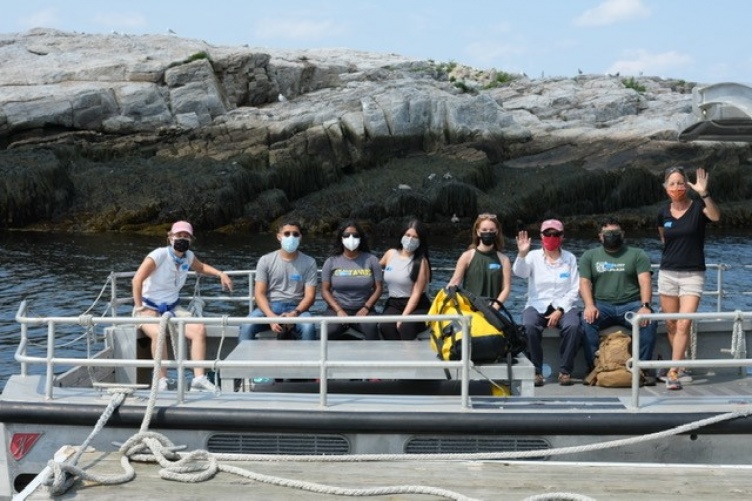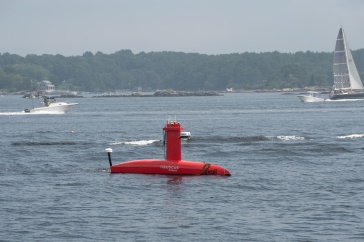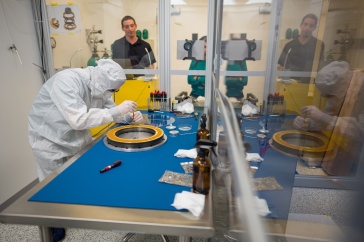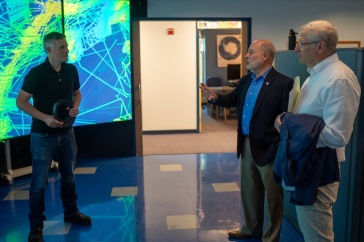
Living on an island has a way of bringing clean water concerns to the fore. This summer, five undergraduates hailing from Puerto Rico and the island nation of Mauritius are turning their homegrown passion for water quality into scientific research that will help propel their young careers.
The students are taking a deeper dive into aquatic research at UNH as part of an eight-week internship co-sponsored by the UNH Coastal Research Response Center (CRRC) and the School of Marine Science and Ocean Engineering (SMSOE).
“The internship program is bringing students from communities underrepresented in the sciences and engineering to UNH to work side-by-side with faculty and students on cutting edge research” says Nancy Kinner, professor of civil and environmental engineering and director for the UNH CRRC. “Our goal is to expose the interns to the value of pursuing advanced degrees and exciting career options. In addition, members of our UNH family have experienced new cultural and academic perspectives.”

Kinner serves as an advisor to three of the students, while Kai Ziervogel, associate research professor of ocean biogeochemistry, and Tracy Mandel, assistant professor of mechanical and ocean engineering, serve as advisors for the remaining two students.
The students are conducting their own mini research projects on topics like measuring oil slick thickness, studying how oil moves underneath ice, examining the impacts of marine snow on the fate of oil spills on the ocean and estimating the rate of microplastics settling in the ocean. They will present their research findings at the McNair Scholars Research Symposium on July 28.
The five students have varying degrees of prior experience in research — some have never been exposed to it, while others have a few projects already under their belts. Astrid Zapata, a senior at the University of Puerto Rico – Mayaguez who is conducting microplastics research with Ziervogel this summer, notes that the scientific process is not always easy. “I think research is supposed to be a challenge in which you can learn, analyze and repeat,” she says. “I would say my experience doing research has been amazing and valuable. Frustration is a variable that is always present, but one that is totally necessary to learn and grow in any field.”
Early in the summer, the students had the unique opportunity to interact with chief scientists from the EPA and NOAA’s Office of Response and Restoration (ORR) as they assisted in conducting some of the experiments alongside the students. “ORR values being able to engage with our next generation of engineers and scientists through this UNH summer diversity internship program,” says Lisa Dipinto, ORR’s chief scientist. “We hope to continue with opportunities to attract and engage with these bright undergraduate students.”
Mauritius citizen Melanie Kistnasamy, a senior at Gustavus Adolphus College in St. Paul, Minnesota, cites this interaction with scientists, including Dipinto, as the most important part of the internship experience. “It allowed me to develop my communication skills and make valuable connections,” she says.
Outside of their labs, the five students have taken part in organized social and cultural activities with the students from the McNair Scholars Program, thus fostering a sense of camaraderie and offering a much-needed break from the rigorous research schedule.
"My mindset about graduate school has changed for the better since I came to UNH and have seen all the research, collaborations and growth that is involved."
Kathy Mandsager, the administrative manager for the CRRC, has been instrumental in setting up the internship logistics and ensuring the program runs smoothly. She hopes that this experience has opened the students’ eyes to the possibility of going to graduate school to study science or perhaps to work with federal agencies like NOAA.
The students are indeed taking these options into consideration, in part due to their positive experience at UNH. Erick Negron, a senior at the University of Puerto Rico – Mayaguez, says he feels that he has a more solid understanding of science and would like to apply that knowledge to search for possible solutions for environmental crises. “My mindset about graduate school has changed for the better since I came to UNH and have seen all the research, collaborations and growth that is involved,” he explains.
“I think the most important part of this internship experience has been the close interaction with scientists and people who were once students like us, because it made me realize that it’s possible to achieve higher levels in the science fields,” adds Zapata. “I’ve also loved seeing so many women as scientists, directors, faculty and students in this science field — it’s impressive, important and necessary.”
The Institute for the Study of Earth, Oceans, and Space (EOS) is UNH's largest research enterprise, comprising six centers with a focus on interdisciplinary, high-impact research on Earth and climate systems, space science, the marine environment, seafloor mapping and environmental acoustics. With more than $60 million in external funding secured annually, EOS fosters an intellectual and scientific environment that advances visionary scholarship and leadership in world-class research and graduate education.
-
Written By:
Rebecca Irelan | Institute for the Study of Earth, Oceans, and Space | rebecca.irelan@unh.edu | 603-862-0990
















































